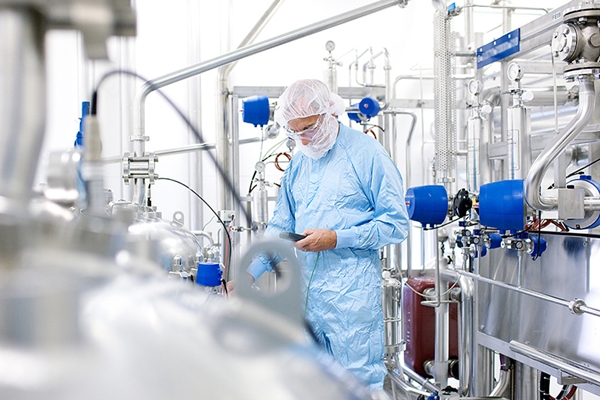



|
Tweet
Pin
It
|
Pharmaceutical Engineering/Technology is a broad field connected to any part of the process of designing, producing, and marketing pharmaceuticals. Basically this field comes under Chemical engineering and is involved in the discovery, design and development of parts and products within pharmaceutical industry. Pharmaceutical engineering utilizes the concept of both biology and biochemistry to design, develop, and manufacture pharmaceutical drugs. Those who work in this field are referred as Pharmaceutical Engineers.
Pharmaceutical engineers design, construct, maintain and operate the technology used to research and manufacture pharmaceutical drugs. Engineers work alongside chemists and pharmacists to research and develop active pharmaceutical ingredients, and then formulate it into the product that a patient takes. Right from designing the product up to packing, pharmaceutical engineers are required at every level of a pharmaceutical organization. Hence, Pharmaceutical engineers must be knowledgeable in areas such as product development, production facilities, processes and equipment, supply chain management, quality control and regulatory compliance. In addition, Pharmaceutical engineers ensure safety at both personal and environmental level. The pharmaceutical sector offers huge scope for engineers to work in the development and manufacture of drugs. As this is a field based on health and medicine, it always ensures job security and is not affected by market fluctuations.
Educational
An undergraduate engineering degree is the minimum requirement to become a pharmaceutical engineer. Only a handful of schools offer bachelor's degree in pharmaceutical engineering, so many enter the field with a Chemical or Industrial engineering degree. The minimum eligibility criterion for undergraduate programs (B.E/B.Tech/B.Sc) in pharmaceutical science and technology/ pharmaceutical engineering is 10+2 pass with Physics, Chemistry, and Mathematics as mandatory subjects. For admission to postgraduate programs (M.E/M.Tech/M.Sc), candidates should hold a Bachelor degree in the relevant subject from a recognized university. Interested candidates can continue their studies after M.Tech by doing research work in the relevant field.
Personal
There are many different skills that a pharmaceutical engineer must possess in order to succeed in his work. A pharmaceutical engineer must have the ability to design, maintain and operate highly specialized technology, so he/she needs critical thinking and analytical skills. He must also possess leadership skills and be innovative. Pharmaceutical engineer must have a thorough understanding of the technical aspects of the work he is doing. Technical knowledge for pharmaceutical engineers may include understanding product development, manufacturing systems, quality control, compliance with regulations and production plants /equipment safety.
From the time medications have become a necessity and are required round the year, this industry has plenty to offer both to fresh graduates and experts. There are a wide variety of careers for engineers to work in each sector of the pharmaceutical industry including research of new drugs and drug delivery systems, scale-up process, manufacturing, labeling and packaging, facility design, management, sales, and education.
A pharmaceutical engineer can easily get employed in pharmaceutical industry, in R&D labs, designing quality drugs for diseases, production and quality systems, biomedical industries. They can find jobs in biopharmaceutical plants, biotechnological plants and Pharmaceutical manufacturing industries. GlaxoSmithKline, Lupin, Dabur Pharma, Ranbaxy Labs, Merck and Cipla are some of the prominent pharmaceutical companies that employ pharmaceutical engineers. Nowadays cosmetic industry needs people from this area of technology. Pharmaceutical engineers also have an option of teaching in colleges/ universities.
Working experience, qualifications, ability are important factors in determining the pay level. Those who are working in the private sector are well paid. Freshers can get a starting salary of Rs 12,000 to Rs 15,000 per month excluding other allowances. In the government sector, the salary range of diploma holders is Rs 9,000 to Rs 12,000 per month. In addition to basic salary they are subject to various allowances, pension and other benefits. With more experience or as an established independent consultant one could earn more. Senior engineers can earn anywhere in between Rs 30,000 and Rs 50,000 a month. Lecturers in colleges get a starting salary of around Rs 20,000/- per month.
Only few colleges offer a bachelor's degree in pharmaceutical engineering, so many enter the field with a chemical or industrial engineering degree.
To get the list of institutes click on the course name.
» B.Sc. Pharmaceutical Technology
» B.Tech. Pharmaceutical Technology
» M.Tech. Bio-Pharmaceutical Technology
» M.Tech. Pharmaceutical Technology
» Bachelor of Pharmacy (B.Pharm)
» Master of Pharmacy (M.Pharm)
Tags
chemical engineering
,
pharmaceutical career
Find it Useful ? Help Others by Sharing Online
Comments and Discussions |
Related
Career Options
|
|||
|
|